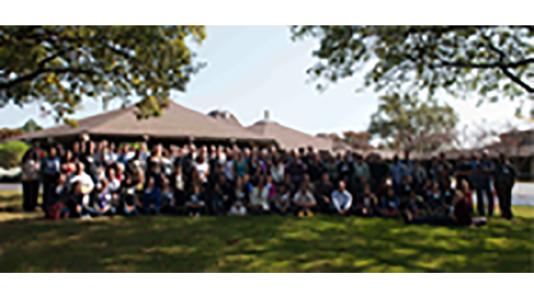
More than 140 researchers from the United States, Canada, Brazil, Asia (Taiwan), and Europe (Czech Republic, France, Germany, Spain) gathered at the Indian Lakes Resort near Chicago to participate in the 4th Annual Argonne Soil Metagenomics meeting October 3–5. The meeting was motivated by recent strides in DNA sequencing technology that have enabled access to staggering volumes of information about soil microbial communities.
Attendees came from six national laboratories (Argonne National Laboratory, PNNL, ORNL, LBL, LBNL, LANL), government institutions (DoD, USDA), forty universities, and seven commercial entities.
Sarah O’Brien, a postdoctoral researcher in Argonne’s Computing, Environment, and Life Sciences (CELS) directorate and primary organizer of the 2012 Soil Metagenomics meeting, pointed out the importance of this annual event in bringing together an interdisciplinary community of microbiologists, ecologists, soil scientists, molecular biologists, and computer scientists. “Only by combining these vastly different domains of science can we make progress in understanding important soil processes,“ O’Brien said. The fact that a significant number of researchers cite this workshop as their favorite meeting is further evidence of its role as a nucleus for future soil metagenomics research.
Folker Meyer, a computational biologist in Argonne’s Mathematics and Computer Science Division and one of the meeting organizers, noted that soil, with many microbial species present at low levels of abundance, is an extremely difficult environment to study. “It presents a number of challenges for computational metagenomics that we are only now beginning to understand,” Meyer said.
The 25 presentations at the Soil Metagenomics meeting ranged from Bayesian theory, to field experiments, to data analysis and informatics. As evidenced by the lively discussions, the combined efforts of researchers in these diverse disciplines are yielding exciting new insights into soil metagenomics: for example, mechanisms for merging “meta” and “omics” data, techniques for “micro”-managing sustainability, and analysis of microbial response to catastrophic events such as wildfire in an Alaskan upload boreal forest.
Argonne researchers, together with their colleagues from other institutions, presented three talks:
- Microbial community responses to plant origin and climate – Kirsten Hofmockel, Sean Gibbons, Sarah Hargreaves, Brian Wilsey, Jack Gilbert
- Binding profiles and crystal structures of solute-binding proteins for transport of aromatic products of lignin degradation: benzoate derivative binding proteins – Karolina Michalska, Changsoo Chang, Jamey C. Mack, Sarah Zerbs, Andrzej Joachimiak, Frank R. Collart
- Spatial structure of soil microbial communities from centimeter to ecosystem – Sarah L. O’Brien, Sarah M. Owens, Jarrad Hampton-Marcell, Julie D. Jastrow, Eric R. Johnston, Daniel P. Smith, Dionysios A. Antonopoulos, Jack A. Gilbert, Folker Meyer
In addition, a significant number of presentations at the workshop used Argonne’s MG-RAST metagenome analysis system (Folker Meyer, CELS), Argonne’s sequencing facility (Sarah Owens, CELS), and Argonne’s APS-driven imaging technology (Ken Kemner, BIO).
Two tutorials on analysis software were held at the meeting. Kevin Keegan, an Argonne postdoctoral appointee (CELS), gave a tutorial on MG-RAST as part of a training workshop on next-generation sequence data analysis; and Greg Caporaso, an assistant professor at Northern Arizona University (and also a joint appointee at Argonne National Laboratory), gave a tutorial on data analysis with QIIME.
Argonne researchers also were involved in several poster presentations in the areas of bioinformatics, data mining, and methods development; microbial diversity across scales; and plant-microbial feedbacks.
At the end of the workshop, experts from Argonne also provided more detailed coverage of the DOE systems biology knowledgebase capabilities for microbial community analysis.
This was the fourth in a series of annual soil metagenomics meetings organized by Argonne. For the first time, the TerraGenome Research Coordination Network collaborated with Argonne as a partner. A postmeeting poll showed that more than 97% of participants think it is likely or very likely that they will participate in next year’s Argonne Soil Metagenomics meeting.